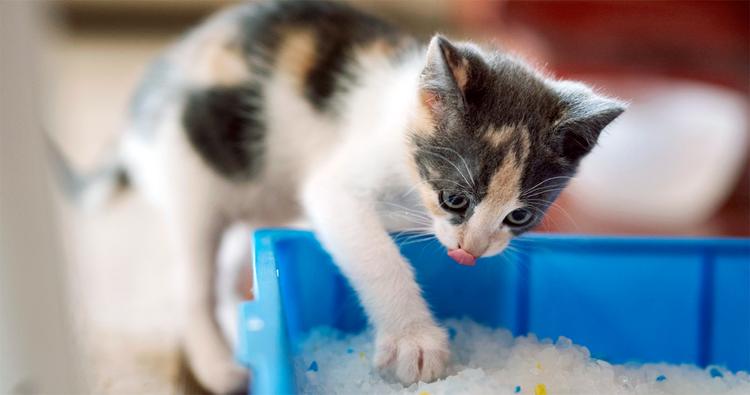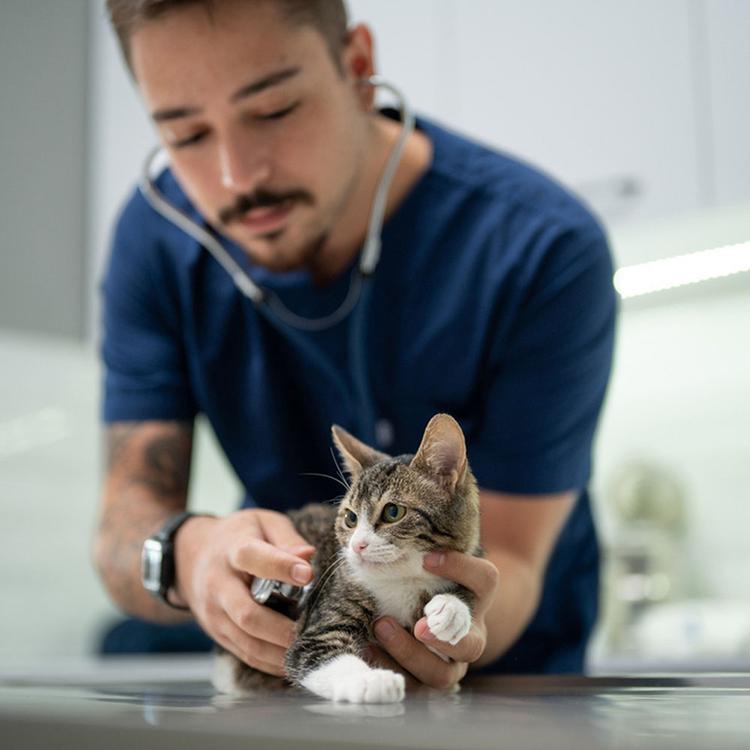When Can Kittens Go Outside?
Learn about the key vaccinations and environmental considerations that go into determining when it’s okay for your kitty to venture out of your home.
Learn about the key vaccinations and environmental considerations that go into determining when it’s okay for your kitty to venture out of your home.
by Emily Johnson, | August 28, 2024

Alba Vitta / Stocksy
If you’ve adopted a kitten, you’ve probably noticed almost immediately that they’re nothing if not curious. Oftentimes that also means you’ll find them gazing out a sliding door or window, wondering what’s out there.
But while it’s important to feed these little creatures’ curiosity, their safety comes first. So it’s important to keep in mind that kittens can usually start exploring the outdoors in a controlled manner around four to six months of age — but only after they’ve completed their core vaccinations and have been spayed or neutered. Figuring out the right time to let them outside also requires you to consider their physical development and surroundings.
Read on for all the tips you’ll need to determine if your kitten is ready to meet the great outdoors.
Before allowing your kitten to venture into the backyard, you need to make sure it’s safe for the little one. Here are some factors to keep in mind before letting kittens go outside.
Rather than simply opening the door and letting your kitten out, pick a controlled environment where you know they’ll be safe. A sunny day in a fenced-in backyard, for example, will keep them contained in an area you’re familiar with, and where you can keep an eye on them. Try to choose a day or time you know will be quiet and calm, away from kids, other pets, and other distractions.
Put away any potentially harmful items such as yard tools, fertilizers, and wiring. To start, it may be even better to keep your kitten on a deck or porch before introducing them to the whole backyard, to avoid overwhelming them.
Your kitten must be fully vaccinated before going outside. The two main vaccines they’ll need are the FVRCP vaccine and the rabies vaccine. These will be given in one to two doses when your kitten is eight to 16 weeks old.
The FVRCP is a core vaccine for cats that protects them against three highly contagious and potentially fatal diseases: feline viral rhinotracheitis (FVR-1, or feline herpesvirus), feline calicivirus (FCV), and feline panleukopenia (FPL, or feline distemper). The initial shot starts at around nine weeks old with a booster at 12 weeks and another at 16 weeks.
The rabies vaccine is usually given to your kitten at around 16 weeks of age, and they won’t need a booster until they reach a year. This inoculation is important because an outdoor cat has a higher risk of catching rabies, since they share an environment with animals potentially carrying the disease, like foxes, raccoons, and skunks.
Going outdoors puts your kitten at risk of fleas and ticks, along with internal parasites. Make sure you use a flea and tick preventative and dewormer specifically for kittens. If you have any questions on what to use, reach out to your veterinarian for suggestions.
Any cat going outside should be spayed or neutered to prevent unwanted litters. Your female kitten can also go into heat and start having kittens as early as six months old. A bonus: Neutered cats (especially males) are much less likely to roam and, in turn, less likely to be hit by cars or get into skirmishes with other animals.
You should wait until your kitten is at least four to five months old before letting them out of the house because they are too vulnerable before that. But by this age, they should be fully vaccinated and spayed or neutered, which is essential for any cat venturing outdoors.
Make sure your kitten is either microchipped (which is usually done when your kitten is spayed or neutered) or has a collar with an ID tag on it. If they wander off and someone finds them, this ensures they’re safely returned to you.
Ready to let your kitten explore? Here are some safe ways to get them out and about.
Try to control as much as you can during your kitten’s first few times outside to make sure it’s a positive experience.
Make sure your kitten is used to coming to you when you call them.
Train them to wear a harness and leash while still indoors, so you can have them comfortably wear one when they go outside.
Try to find a time when distractions and noises will be at a minimum.
Put away or block off any potentially dangerous tools or toxic plants.
Always watch your kitten as they explore outdoors to make sure they don’t wander off or get into anything they shouldn’t. As they get older and more used to being outside, you can consider letting them out on their own.
Start slowly with small increments of outdoor time. As your kitten gets more used to being outside, you can increase their time little by little to enjoy more time exploring. Plopping your kitten outside at random for a long amount of time can stress your poor kitty out at the sudden change.
You can take your kitten outside on a leash after they’ve been fully vaccinated and spayed or neutered, which is usually around four to six months of age. Start using a harness and leash while they’re still indoors so they can get used to wearing it before going outside.
Before introducing your kitten to the outdoors, there are some boxes to check to make sure it’s a safe and positive experience.
Wait until they’re fully vaccinated
Get them spayed or neutered first
Use preventatives for pests and parasites
Stay in a controlled, safe environment
Start off in short sessions and slowly increase time outside
Always supervise your kitten while outdoors
For extra security, get them used to wearing a harness and leash while they explore
A kitten’s shots schedule usually begins when they’re around six to eight weeks old, with boosters every few weeks until they reach about 16 weeks. Core vaccines for cats who plan to go outside include rabies, FVRCP, and FeLV (feline leukemia).
Vaccines can range in price depending on your location and the clinic you visit. If you go to a low-cost shot clinic, you can expect to spend $15 to $20 per shot, but that may be more expensive if you go to your regular veterinarian. There are also options for people who need assistance paying for vet bills, including vaccinations.
Kittens can go outside starting at around four to six months of age, but only after they’ve completed their core vaccinations and have been spayed or neutered. It’s important to start them off with supervised time outside, so they get used to this new experience.

Emily Johnson is a long-time pet writer and animal lover, working with brands like PetMD, Rover, Kinship, and more. She’s cared for dogs, cats, and horses her entire life and strives to help fellow pet parents through her content.

Adoption Advice

Behavior & Training

Adoption Advice

Behavior & Training
Is your cat refusing to use their litter box? Explore these tactics to address and resolve this issue.

Behavior & Training
Cats aren’t bad, they’re just wild. Here’s how to satisfy their natural instincts without sacrificing your home — or sanity.

Adoption Advice
Ear-tipped cats might be friendly — but they shouldn’t always come home with you. Learn what their ears indicate, and when it’s okay to adopt them.

Adoption Advice
The benefits and challenges of adopting an outdoor cat, plus tips to keep them happy and healthy

Behavior & Training

Behavior & Training

Behavior & Training
Is your new cat scratching everything in sight? It’s natural, but not necessary. Here are proven ways to discourage that behavior.

Adoption Advice
Uncover the truth behind this practice and its impact on feline well-being.

Adoption Advice
Preparing for a kitten’s first vet visit. Learn about what you can expect from a vet visit and what you should do to ensure it goes smoothly.